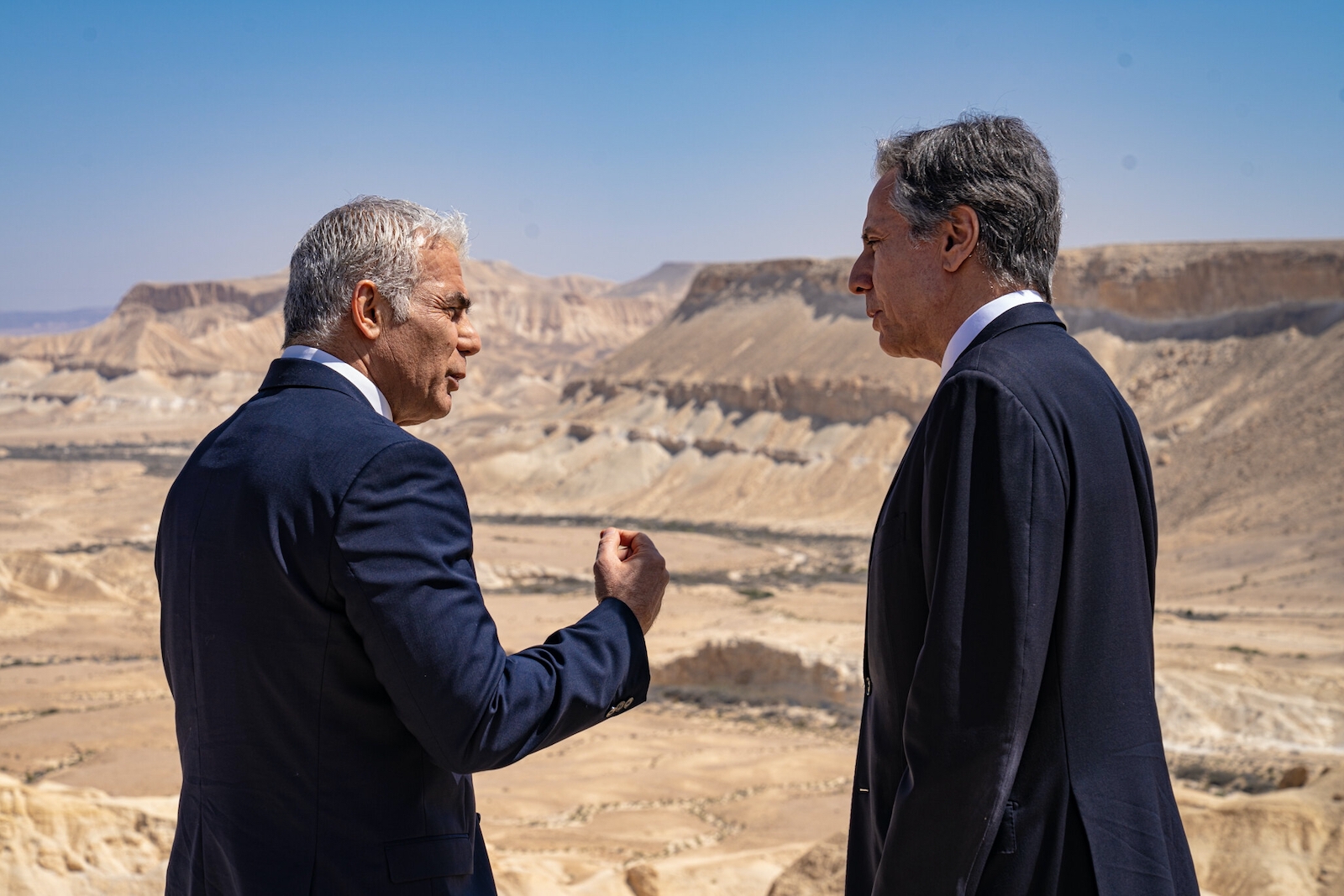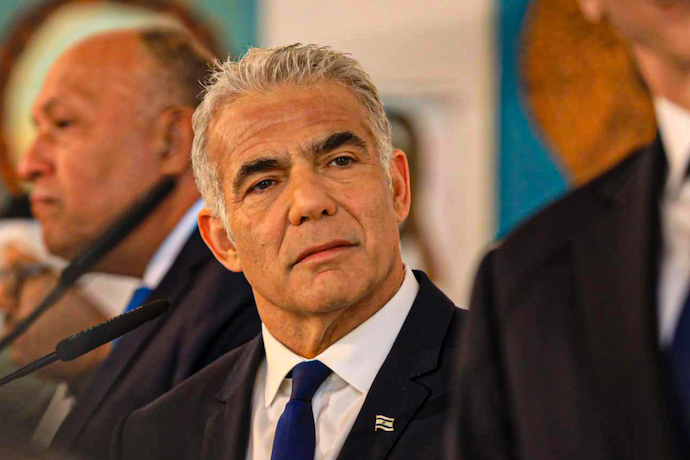
The Evolution of the Abraham Accords
This week’s unprecedented Negev Summit in Sde Boker, where Foreign Minister Yair Lapid hosted Secretary of State Antony Blinken alongside the foreign ministers of the UAE, Bahrain, Morocco, and Egypt, was widely hailed as a new milestone in the regional normalization process. Even if judging by the optics alone, it signaled a step forward that Israel was the convener of this diplomatic gathering and that, in contrast to how it would have been perceived a few short years ago, it did not seem like a revolutionary moment or out of place. The step forward, however, was not simply about the meeting taking place on Israeli soil or the inclusion of such a wide group. The content of the summit demonstrates how the normalization process is evolving and maturing, including in one key way beyond what the Abraham Accords’ architects intended.
There is an often-held assumption that the Abraham Accords were primarily driven by the common threat of Iran, and that a straight line can be drawn from the 2015 Iran nuclear deal to Gulf states’ willingness to normalize with Israel as a way of constraining Iranian regional hegemony. Iran absolutely is a thread that ties these countries together, but as Jacob Magid’s report on the Negev Summit smartly noted, Iran—and particularly the nuclear aspect—looms much larger for Israel than it does for the other summit attendees. There is a wide range of issues that they care about and that they want to address through regional coordination, from trade to clean energy, and the fact that this was not just an emergency meeting on Iran demonstrates how normalization begets normalization. Of the six new working groups that were announced, only one of them is related to regional defense issues and countering Iran; the other five are energy, tourism, health, education, and food and water security.
That the Abraham Accords are more than a regional security coordination mechanism is a good thing for their future sustainability. Threats and strategic approaches change over time, and were normalization primarily about a single shared interest driven by a current threat perception, it would render normalization not only incomplete but illusory. The fact that Israel’s new partners want to focus on other things and not get bogged down on Iran may be a source of frustration for Israel in the short term given Jerusalem’s alarm about the potential U.S. reentry into the Iran nuclear agreement and what it will mean for sanctions on Iran, but it will be beneficial in the long term.

Perhaps the most interesting aspect of the Negev Summit was another variable that is unrelated to Iran, and that is the Israeli-Palestinian conflict. When the Abraham Accords were first announced, it was abundantly clear that the Accords’ Trump administration architects and then-Prime Minister Benjamin Netanyahu viewed normalization as a way not only around the Palestinians but around the idea that resolving the Israeli-Palestinian conflict was still relevant. In the speeches on the White House South Lawn accompanying the Abraham Accords signing ceremony, there were only two glancing references to Palestinian statehood and a two-state solution—one each by the Emirati and Bahraini foreign ministers—and the message in the aftermath was that Israel and the region were moving on.
The contrast with this week’s summit was glaring. It began with Blinken’s statement that “we have to be clear that these regional peace agreements are not a substitute for progress between Palestinians and Israelis,” which was followed by his stressing that the day involved conversations about how the countries in the room can work together to create the necessary conditions for a two-state agreement. Bahraini Foreign Minister Abdullatif bin Rashid Al Zayani came next, and included resolving the Israeli-Palestinian conflict as one of the shared regional challenges to be confronted while urging Israel and the Palestinians to come together for negotiations over Palestinian statehood. Egyptian Foreign Minister Sameh Shoukry went further, mentioning the Israeli-Palestinian peace process before any other issue in his remarks and emphasizing the importance of maintaining the credibility and viability of a two-state solution that results in a Palestinian state with a capital in East Jerusalem. Moroccan Foreign Minister Nasser Bourita echoed Shoukry in calling for a Palestinian state with a capital in East Jerusalem in a manner that will safeguard Israeli interests and Israeli security. While Lapid did not go as far as his colleagues, he did talk about opening the door to the Palestinians to help build a better future for the region. The only summit attendee who did not address the Israeli-Palestinian issue at all was Emirati Foreign Minister Abdullah bin Zayed Al Nahyan.
The focus on Israeli-Palestinian issues was also not solely through a Palestinian lens, which is important as well. All of the ministers save Shoukry explicitly condemned the previous day’s terrorist attack in Hadera in which two Israelis were killed, and Blinken, Al Zayani, and Bourita led their remarks with their condemnation and with condolences to the victims’ families. The references to two states also nearly all mentioned Israeli interests and Israeli security, which is an important acknowledgment that Israeli concerns with regard to the potential negative ramifications of a two-state outcome are not being dismissed by Israel’s Arab neighbors.
To state the obvious, for any of this to mean anything, it has to go beyond mere words. There have been few concrete steps that the Abraham Accords states have taken in tandem to address Israeli-Palestinian issues, either on the Palestinian side or the Israeli side, and Jordan’s absence from the summit was viewed as a protest over the fact that the Israeli-Palestinian conflict is not front and center and that the Palestinians have not been included. Any discussion of this is also incomplete without noting that the Palestinians themselves still refuse to face the reality of the new regional dynamics, and the Palestinian Authority predictably condemned Israel for convening the summit, charging that it was a cover-up for annexation, settlement expansion, and preventing a Palestinian state. While reports are that Blinken pushed hard for moves to improve Palestinian quality of life and create a political horizon for two states, the summit was largely focused on other things.
But the public messaging should not be discarded out of hand, since it is a shift in how the normalizing states themselves are presenting their interests and the benefits of greater cooperation. There is a long way to go before normalization impacts the Israeli-Palestinian conflict in a tangibly beneficial way, and the challenges of talking about a two-state process are only magnified in a week with multiple terrorist attacks that have killed 11 Israelis. But the fact that normalization is increasingly and more extensively being connected to a two-state outcome rather than as a way around an Israeli-Palestinian resolution is a necessary first step.
It also highlights the important role that the U.S. can and must play in this regard, since just as the initial messaging around normalization was responding to the Trump administration’s lead, the shift in tone is responding to the Biden administration’s priorities. This must all be viewed with the appropriate perspective, as it is not anything close to a breakthrough. But it may be the harbinger of a new phase for the Abraham Accords, where economic and security cooperation continue to proceed with increasing speed while more attention and effort are simultaneously devoted to leveraging these new relationships to help Israel and the Palestinians get to a similar spot.
This article was originally posted in Ottomans and Zionists.

